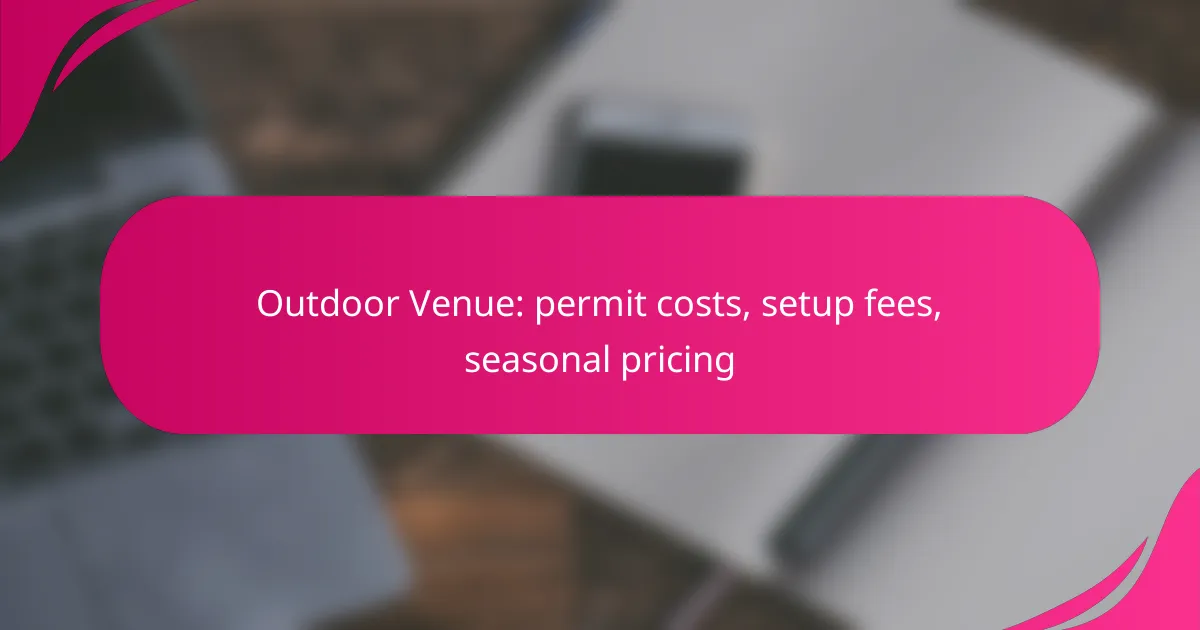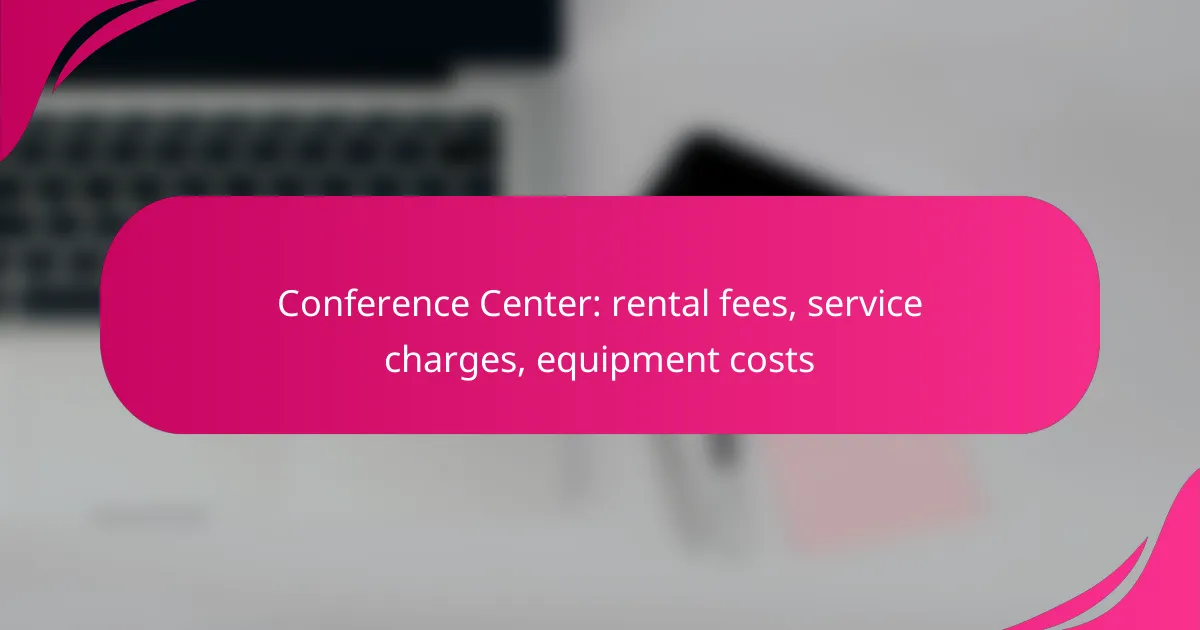When planning an event at an outdoor venue, it’s essential to consider various costs, including permit fees, setup charges, and seasonal pricing. Permit costs can range widely based on location and event type, while setup fees depend on the venue’s specifics and services provided. Additionally, seasonal pricing can significantly affect overall expenses, with higher rates during peak seasons and potential discounts during off-peak times.
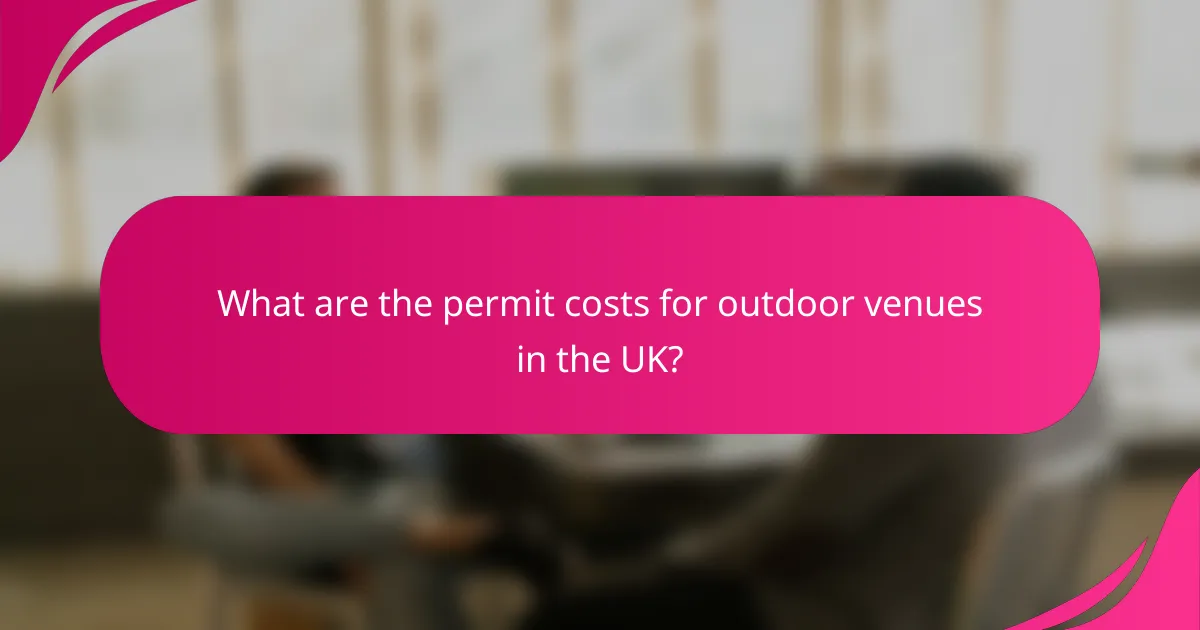
What are the permit costs for outdoor venues in the UK?
Permit costs for outdoor venues in the UK can vary significantly based on location, type of event, and duration. Generally, these fees can range from low tens of pounds to several hundred pounds, depending on the specific requirements set by local authorities.
Average permit costs
The average permit costs for outdoor venues in the UK typically fall between £50 and £500. Smaller events, such as community gatherings, may incur lower fees, while larger festivals or commercial events could see costs reaching upwards of £1,000. It’s advisable to check with the local council for precise figures.
Factors affecting permit costs
Several factors can influence the permit costs for outdoor venues. These include the size of the event, the expected number of attendees, and the specific location within the UK. Additional requirements, such as security measures or health and safety assessments, may also contribute to increased costs.
Another important consideration is the duration of the event. Longer events may require more extensive permits, leading to higher fees. Additionally, seasonal pricing can apply, with peak times often resulting in increased costs due to higher demand for outdoor spaces.

What are the setup fees for outdoor venues?
Setup fees for outdoor venues typically cover the costs associated with preparing the site for an event. These fees can vary significantly based on the venue’s location, size, and the specific services included.
Typical setup fee ranges
Setup fees for outdoor venues generally range from a few hundred to several thousand dollars. Smaller venues may charge around $200 to $1,000, while larger or more popular locations can have fees exceeding $5,000. Seasonal demand can also influence these costs, with peak seasons often leading to higher fees.
Included services in setup fees
Setup fees usually encompass a variety of services, including site preparation, equipment rental, and basic utilities. Commonly included items are tables, chairs, tents, and lighting, which can significantly enhance the event experience.
It’s essential to clarify what is included in the setup fees before booking. Some venues may charge extra for additional services such as catering equipment or specialized decor, so understanding the full scope of what you are paying for can help avoid unexpected costs.
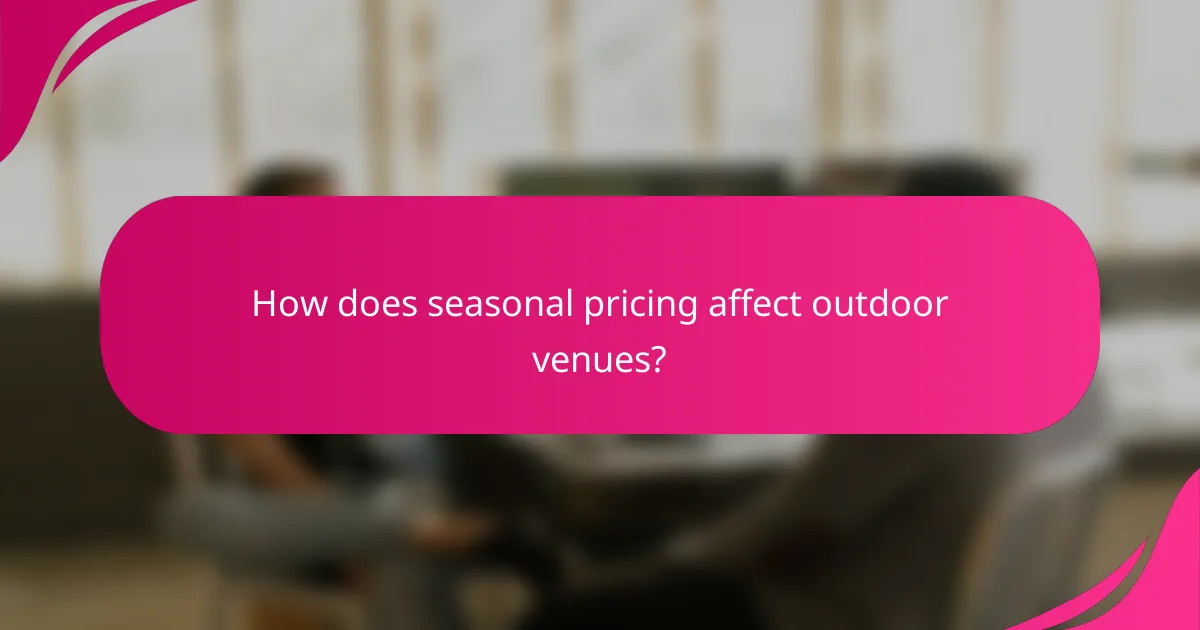
How does seasonal pricing affect outdoor venues?
Seasonal pricing significantly impacts outdoor venues by adjusting costs based on demand fluctuations throughout the year. Typically, venues charge higher rates during peak seasons when demand is at its highest, while offering discounts during off-peak times to attract more customers.
Peak season pricing
Peak season pricing refers to the elevated rates charged by outdoor venues during their busiest times, often coinciding with favorable weather and holidays. For example, in many regions, summer months and holiday weekends can see prices increase by 20-50% compared to off-peak times.
When planning an event during peak season, it’s crucial to book early, as venues may have limited availability. Additionally, consider negotiating package deals that may include setup fees or additional services to offset higher costs.
Off-peak season discounts
Off-peak season discounts are reduced rates offered by outdoor venues during times of lower demand, such as late fall or winter months. Discounts can range from 10-30%, making it an attractive option for budget-conscious planners.
Utilizing off-peak pricing can also provide more flexibility in scheduling and venue selection. However, be aware of potential weather-related issues and ensure that the venue has adequate provisions for inclement conditions, such as tents or heating options.
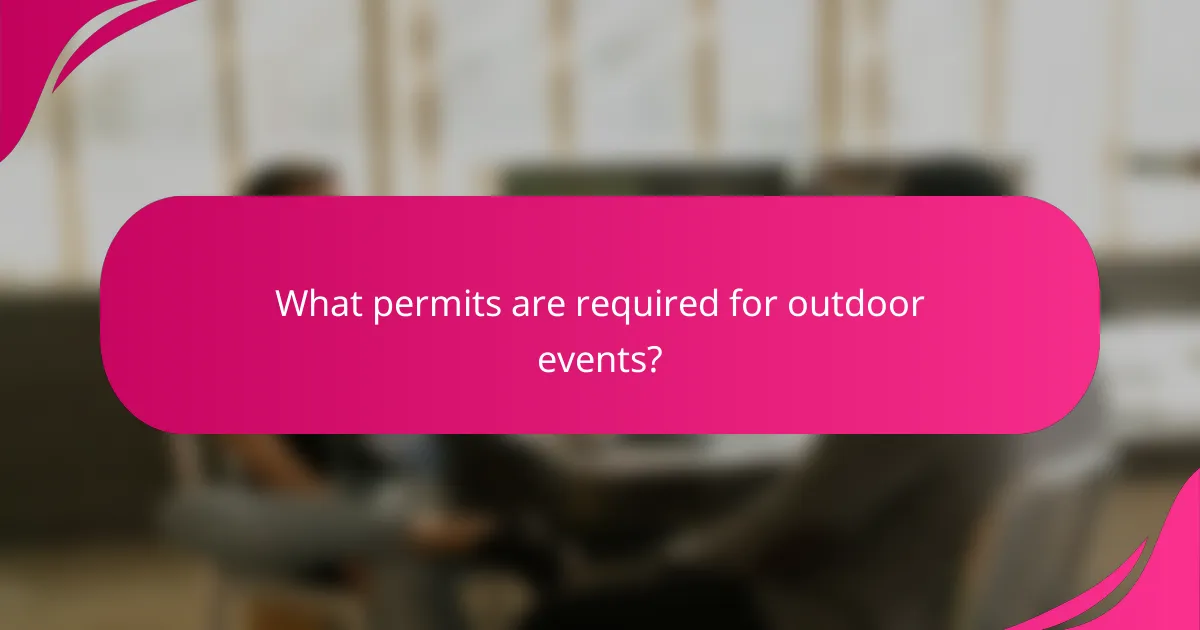
What permits are required for outdoor events?
Outdoor events typically require various permits to ensure compliance with local regulations. These permits can include special event permits, noise permits, and health permits, depending on the nature of the event and its location.
Types of permits needed
The types of permits required for outdoor events can vary significantly based on the event’s size, location, and activities involved. Common permits include:
- Special Event Permit: Required for gatherings in public spaces, often involving large crowds.
- Noise Permit: Necessary if the event includes amplified sound or music.
- Food and Beverage Permit: Needed if food or drinks are served, particularly if they are sold.
- Alcohol Permit: Required for events serving alcohol, which may involve additional regulations.
Application processes for permits
Applying for permits generally involves submitting an application to the local government or relevant authority. This process can take several weeks, so it’s advisable to start early. Be prepared to provide details about the event, including its purpose, expected attendance, and location.
Some municipalities may require a public notice or community meeting as part of the application process. Always check local regulations to ensure compliance and avoid potential delays. Additionally, fees for permits can range from modest amounts to several hundred dollars, depending on the type and scale of the event.

How to choose the right outdoor venue?
Choosing the right outdoor venue involves considering factors such as location, capacity, amenities, and costs. Evaluating these elements will help ensure the venue meets your event’s needs and budget.
Key selection criteria
When selecting an outdoor venue, prioritize aspects like accessibility, available facilities, and the overall ambiance. Consider how many guests you expect and whether the space can comfortably accommodate them.
Cost is another crucial factor; investigate permit costs, setup fees, and seasonal pricing. For instance, some venues may charge higher rates during peak seasons or weekends, while others might offer discounts for off-peak times.
Lastly, check for any restrictions or regulations that may apply, such as noise ordinances or alcohol permits, to avoid potential issues on the event day.
Local venue recommendations
In the United States, popular outdoor venues include parks, gardens, and waterfronts. For example, Central Park in New York City offers various spaces for events, while the National Mall in Washington, D.C. provides a scenic backdrop for larger gatherings.
In Europe, consider venues like the Jardin des Tuileries in Paris or the Royal Botanic Gardens in London. These locations not only provide beautiful settings but also have established guidelines for permits and fees, which can vary widely.
Research local options and read reviews to find venues that align with your vision and budget. Always reach out to venue managers for detailed pricing and availability to make an informed decision.
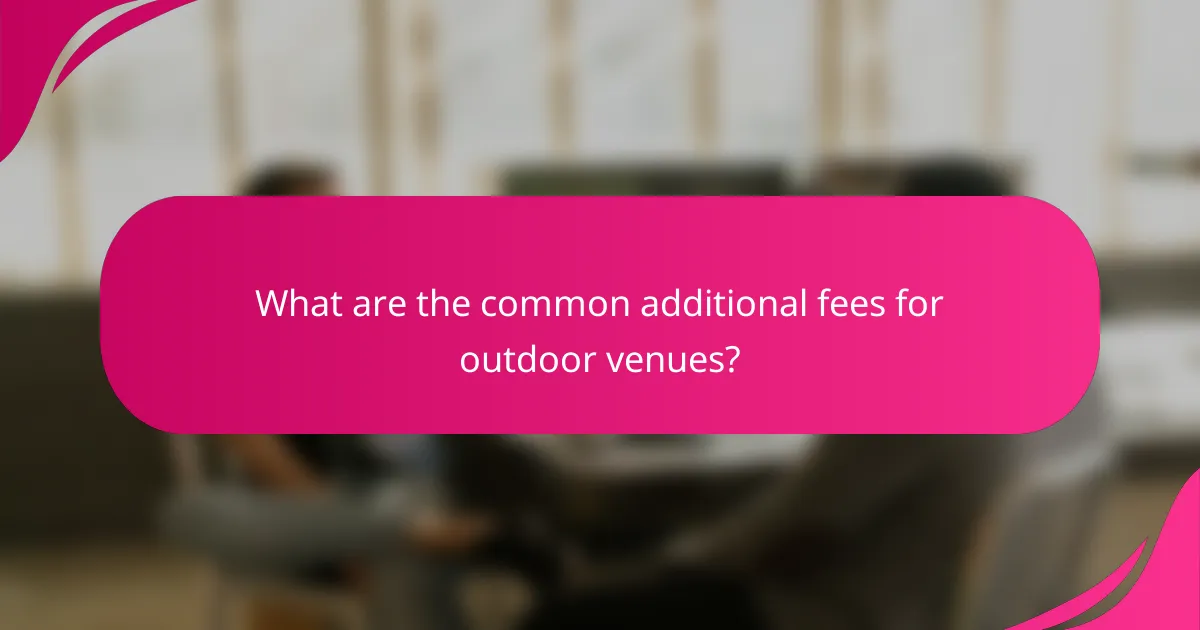
What are the common additional fees for outdoor venues?
Outdoor venues often incur additional fees beyond the basic rental cost, including insurance, cleanup, and maintenance charges. Understanding these common fees can help you budget effectively for your event.
Insurance requirements
Many outdoor venues require event organizers to obtain liability insurance to cover potential damages or accidents. This insurance can range from a few hundred to several thousand dollars, depending on the venue’s size and the event’s nature.
When planning, check the venue’s specific insurance requirements early on. Some venues may offer recommendations for providers, which can simplify the process and ensure compliance with their policies.
Cleanup and maintenance fees
Cleanup and maintenance fees are often charged to ensure the venue is returned to its original condition after the event. These fees can vary widely, typically ranging from a flat fee of a few hundred dollars to a percentage of the rental cost.
To avoid unexpected charges, clarify the cleanup responsibilities with the venue. Some venues may require you to hire their cleaning service, while others may allow you to manage it yourself, potentially saving you money.

What are the trends in outdoor venue pricing?
Outdoor venue pricing is increasingly influenced by factors such as demand fluctuations, sustainability initiatives, and innovative pricing models. Understanding these trends can help event planners make informed decisions about budgeting and venue selection.
Emerging pricing models
Many outdoor venues are adopting flexible pricing models that adjust based on demand, seasonality, and event type. For instance, venues may offer lower rates during off-peak seasons or for weekday events, while charging premium prices for popular dates and times.
Additionally, some venues are implementing tiered pricing structures, where costs increase as the event date approaches. This encourages early bookings and helps venues manage capacity more effectively.
Impact of sustainability on costs
Sustainability practices are becoming a significant factor in outdoor venue pricing. Venues that prioritize eco-friendly initiatives, such as waste reduction and renewable energy use, may charge higher fees to cover the costs of these practices. However, many clients are willing to pay a premium for venues that align with their values.
Furthermore, venues that implement sustainable practices can often benefit from long-term cost savings, which may be reflected in more competitive pricing over time. Event planners should consider how a venue’s sustainability efforts can impact overall costs and align with their event goals.
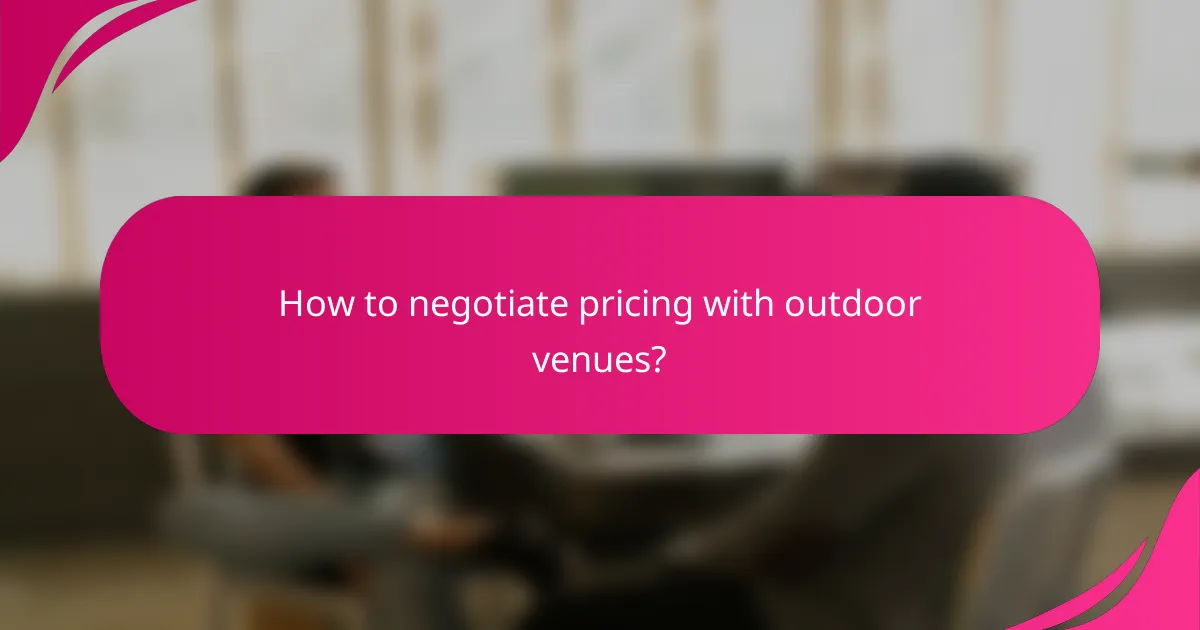
How to negotiate pricing with outdoor venues?
Negotiating pricing with outdoor venues involves understanding their fee structures and being prepared to discuss your needs. Effective negotiation can lead to significant savings on permit costs, setup fees, and seasonal pricing adjustments.
Effective negotiation strategies
Start by researching typical costs for outdoor venues in your area, including permit fees and setup charges. Knowing the average price range helps you identify what is reasonable and gives you leverage during discussions. For instance, if the standard venue fee is around $1,000 to $2,000, you can negotiate towards the lower end based on your budget.
When approaching the venue, be clear about your requirements and the date of your event. Venues may offer discounts for off-peak seasons or for weekday bookings, so inquire about these options. For example, booking a venue in early spring or late fall might yield lower rates compared to peak summer months.
Lastly, consider bundling services to enhance your negotiation position. If you need additional services like catering or equipment rental, ask if the venue can provide a package deal. This not only simplifies logistics but can also lead to a more favorable overall price.
